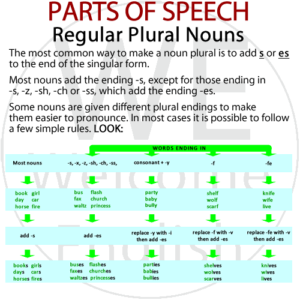A NOUN IS A WORD USED TO NAME PEOPLE, ANIMALS, PLACES OR THINGS
Nouns are often called “naming” words. Every sentence must have at least one noun or pronoun. Most nouns can be either singular or plural, and can be divided into two main groups: common and proper nouns.
Common Nouns
Common nouns are used to describe everyday objects, animals, places, people and ideas. They only have a capital letter when they appear at the start of a sentence.
Examples: cake, dog, woman, piece, book
Abstract Nouns
Abstract nouns are a type of common noun and are used to describe ideas, feelings, time things that cannot be touched.
Examples: morning, love, sadness, peace, trust
Collective Nouns
Collective nouns are a type of common noun and refer to a group of things or people. They are usually singular words that represent a collection of things.
Examples: a crowd of people, a pack of dogs, a flight of stairs, a herd of cows
Proper Nouns
A proper noun is the name given to a particular person, place, animal, and religion. Proper nouns always start with a capital letter.
Examples: John, Sally, Mr., Mrs. Sir, Friday, May, Koran, Catholic

